The Third Annual Conference of Government and Economics
On May 22nd, the Third Annual Conference of Government and Economics and the Launch Ceremony for the Journal of Government and Economics were successfully held in Beijing. The events were jointly organized by the Tsinghua University School of Social Sciences, the Tsinghua University Academic Center for Chinese Economic Practice and Thinking (ACCEPT), and the Society for the Analysis of Government and Economics (SAGE).
Opening speeches were delivered by Peng Gang, Vice President of Tsinghua University, David Daokui Li, Director of ACCEPT and Co-President of SAGE, and Eric S. Maskin, 2007 Nobel Laureate in Economics, Adams University Professor at Harvard, and Co-President of SAGE. Other esteemed keynote speakers included Ge Honglin, President of the China Nonferrous Metals Industry Association and former Mayor of Chengdu; Gao Peiyong, Vice President of the Chinese Academy of Social Sciences (CASS); Wu Xiaoqiu, Vice Chairman of the Academic Committee of Renmin University of China (RUC) and Dean of the China Capital Market Research Institute (CCMR); Marcos Troyjo, President of the New Development Bank (NDB) and former Minister of the Economy of Brazil; and Nicholas Stern, IG Patel Professor of Economics and Government at the London School of Economics and Political Science (LSE), Fellow of the British Academy, and Co-Chair of the Global Commission on the Economy and Climate.
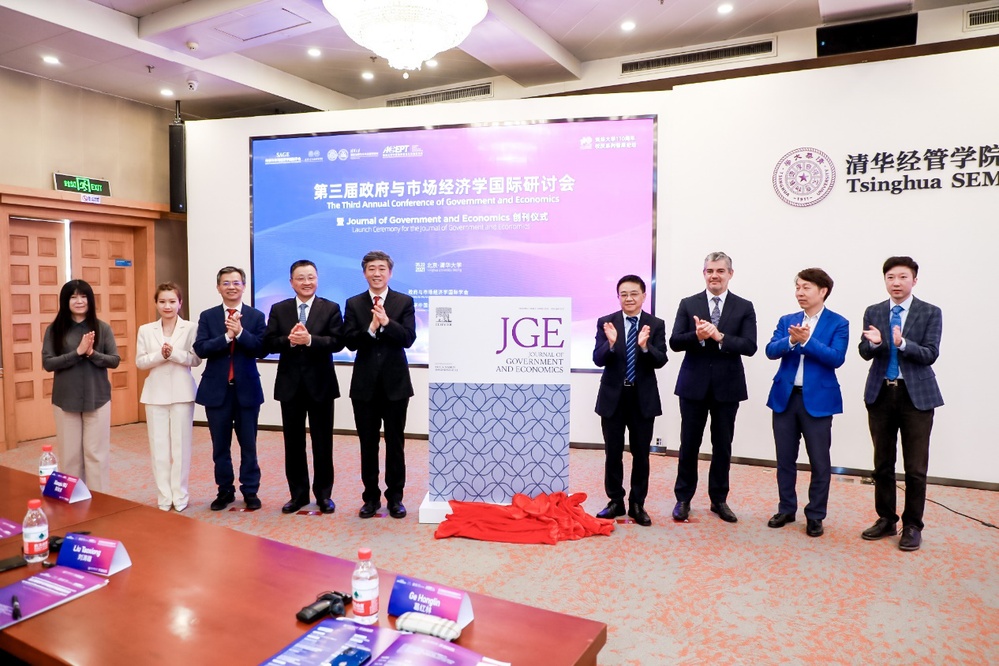
The conference also featured the launch of the Journal of Government and Economics (JGE), a new international academic journal in economics. Louise Curtis, Senior Vice President of Life and Social Sciences Publishing at Elsevier, spoke highly of JGE’s publication as the first professional international journal in the field of government and economics. The new journal was inaugurated by Marcos Troyjo, President of the NDB; Ge Honglin, former Mayor of Chengdu; Peng Gang, Vice President of Tsinghua University; Liu Taoxiong, Secretary of the Party Committee of the School of Social Sciences at Tsinghua University; David Daokui Li, Director of ACCEPT; Li Ke'aobo, Executive Deputy Director of ACCEPT; Huang Zhangkai, Managing Editor of JGE and Professor of the Tsinghua School of Economics and Management; and representatives from Elsevier Publishing.
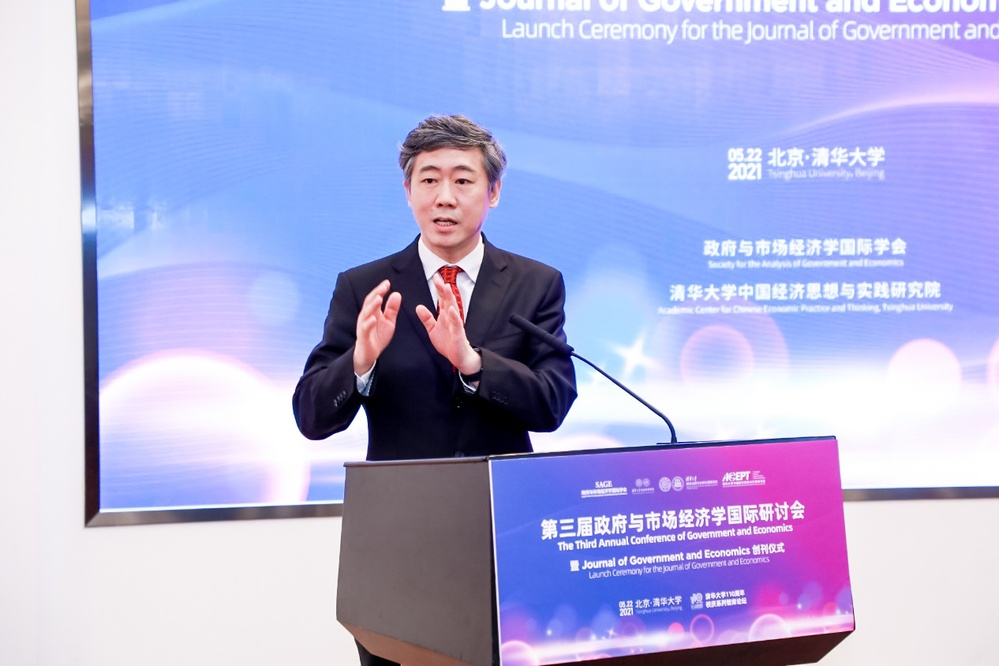
In his speech, David Daokui Li introduced the emerging field of government and economics, explaining that it is the project of a group of economic scholars from Tsinghua University and around the world who have worked to carefully construct this new branch of study over the past few years. He then demonstrated the need for this new field by showing that governments have become extremely active and important players in the modern market economy. Almost all modern government expenditures account for more than 30% of total GDP (up to 50% in many countries), and this proportion continues to increase, especially after natural disasters, epidemics, and international financial crises. Government behavior is a critical determining factor as to whether an economy will be able to develop well, run smoothly, and avoid financial crises. Furthermore, beneficial or detrimental government behavior is determined by a series of mechanisms that influence the behavior of government employees and policymakers. The driving purpose of the study of government economics is to determine what role the government should play and which government mechanisms are most suitable to help the market economy unleash its maximum potential.
Professor Li pointed out that scholars in China and abroad agree that one of the basic lessons conveyed by China's economic development over the past 70 years is that the relationship between the government and the market, as well as internal government affairs, must be managed well. Furthermore, this reality has been overlooked by contemporary economics research. He expressed his hope that the new field of government and economics will broaden the vision of economics research both domestically and internationally, helping the world to better understand China, and in doing so, encouraging greater acceptance of the practices that China has found effective for managing its market economy.
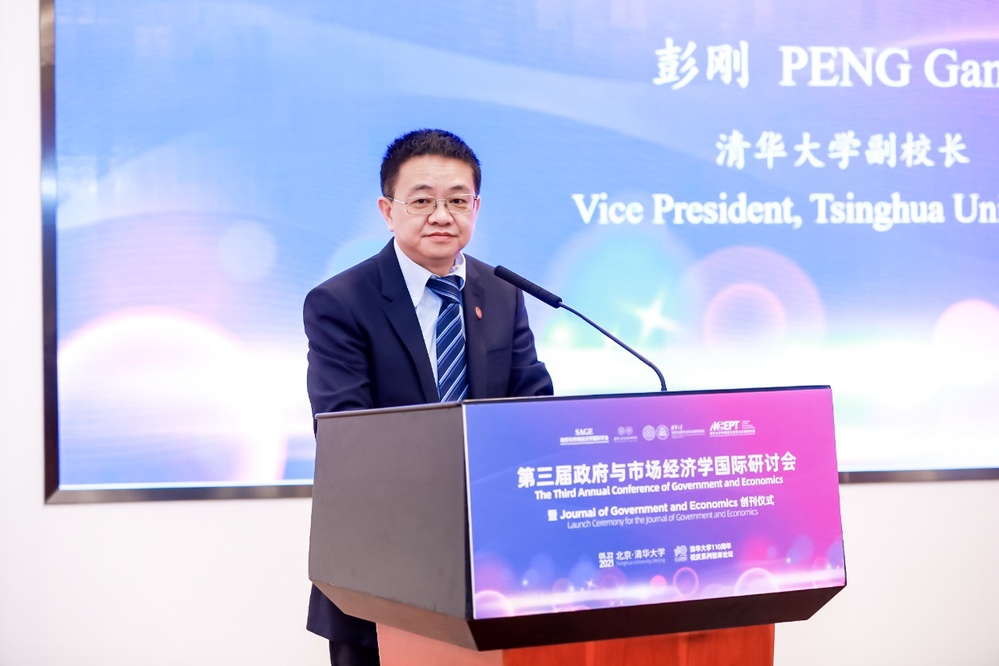
In Peng Gang’s remarks, he expressed that the Third Annual Conference of Government and Economics was an important component of Tsinghua University’s 110th Anniversary activities. Tsinghua University is the birthplace of modern Chinese social sciences, and has emphasized the integration of arts and sciences and the synthesis of East and West since its founding. The university’s social sciences have been developing since the early 20th century, leading to a glorious tradition of teaching, research, and talent cultivation which has made important contributions to the founding and development of various modern Chinese sciences and the construction of Chinese politics, economy, and society. Vice President Peng said that the future development of liberal arts at Tsinghua University will be devoted to building a number of disciplines based on Chinese economic practice with universal global significance, and that government and economics is an important direction to explore in the field of economics. In addition, the establishment of the Journal of Government and Economics is a monumental milestone in the development of related disciplines. He emphasized that Tsinghua University will continue to firmly support the creation of the field of government and economics, integrate Chinese practice into its development, and further explore the reform of curricula and teaching materials to contribute to the development of economics education around the world.
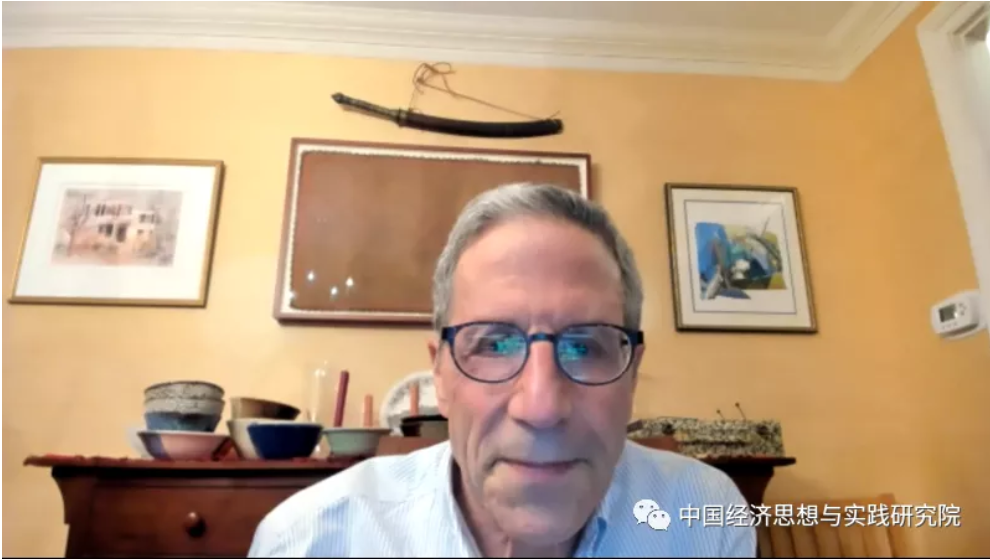
SAGE Co-President Eric S. Maskin began by affirming the importance of government and economics as an independent field of study: that is, the government plays a critical role within advanced market economies, influencing the performance and prosperity of markets. He argued that compared to Adam Smith's time, government participation in GDP has increased from 5-20% to 60%, with significant changes in the role and status of economic activity. First, Professor Maskin showed that starting from the 19th century, government has contributed prominently to the tasks of guaranteeing social welfare, building infrastructure, maintaining public education, caring for the ecological environment, maintaining market regulation, providing public goods, protecting new industries, subsidizing scientific research, and curbing the inequitable distribution of social resources. Next, he used the historical cases of the US, Germany, Japan, and Korea in the 20th century as examples to demonstrate the importance of government support in the process of economic emergence. Furthermore, he spoke of the case of China during reform and opening up as another vivid example of a government taking the initiative to interact positively with the market through a number of measures such as supporting relevant enterprises, facilitating land conversion, and expanding and deepening financial markets. Regarding the launch of the Journal of Government and Economics (JGE), Maskin pointed out that this new journal will help fill a significant gap in current economic research, which has failed to adequately address the government’s role, incentives, and behavior within a market economy under the existing frameworks of public economics, public choice theory, industrial organization theory, and political economy. Moving forward, JGE will be able to provide the relationship between government and economy with the attention and in-depth research that it deserves.
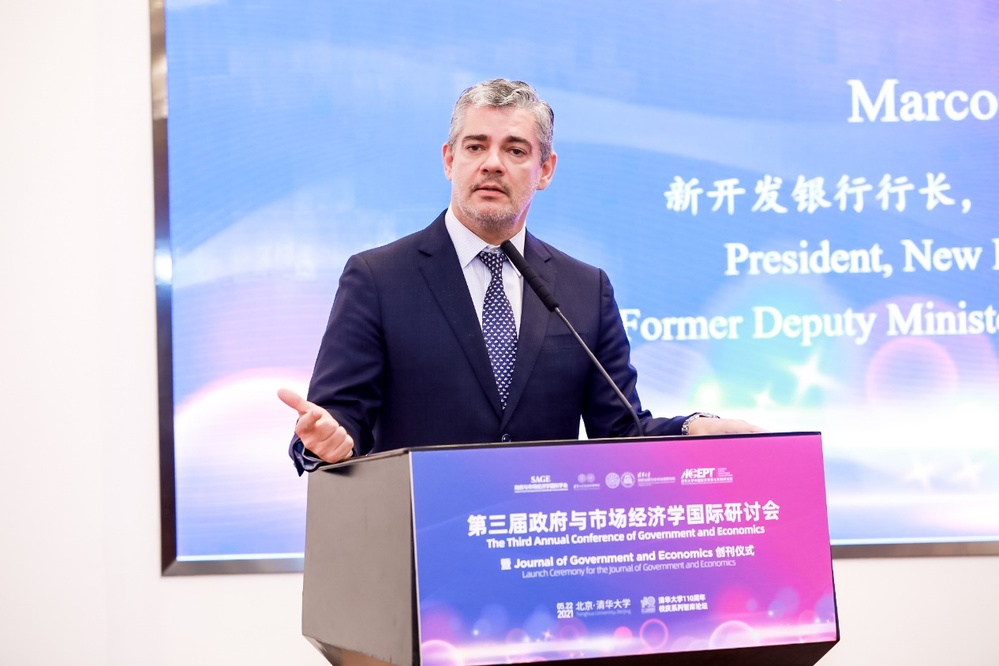
In his speech, Marcos Troyjo suggested that successful interactions between the government and economy are a key component of a nation’s ability to develop, rise, and prosper. Nations rise when they successfully react to the changing contours of globalization, and because the conditions of globalization are constantly changing, the relationship between government and economy must also adjust. The past few years have seen a trend of de-globalization along with a resurgence of protectionism and economic nationalism, and Mr. Troyjo argues that several features of the new phase of globalization have emerged. First, due to the changing international landscape, many of the strategies that have been successful for traditional economies are not particularly effective for emerging countries. Second, the interactions between governments and economies have led to a restructuring of the global industrial chain in which geopolitical factors are secondary to the individual evolution of important economies, such as China. Third, an interdisciplinary, multifaceted talent pool with strong core skills is likely to be the most important factor of production in the next 30-40 years. Today's global cooperation, says Troyjo, is inadequate due to a lack of mutual trust in confluence with geopolitical factors, and must be bridged by multilateral development banks.
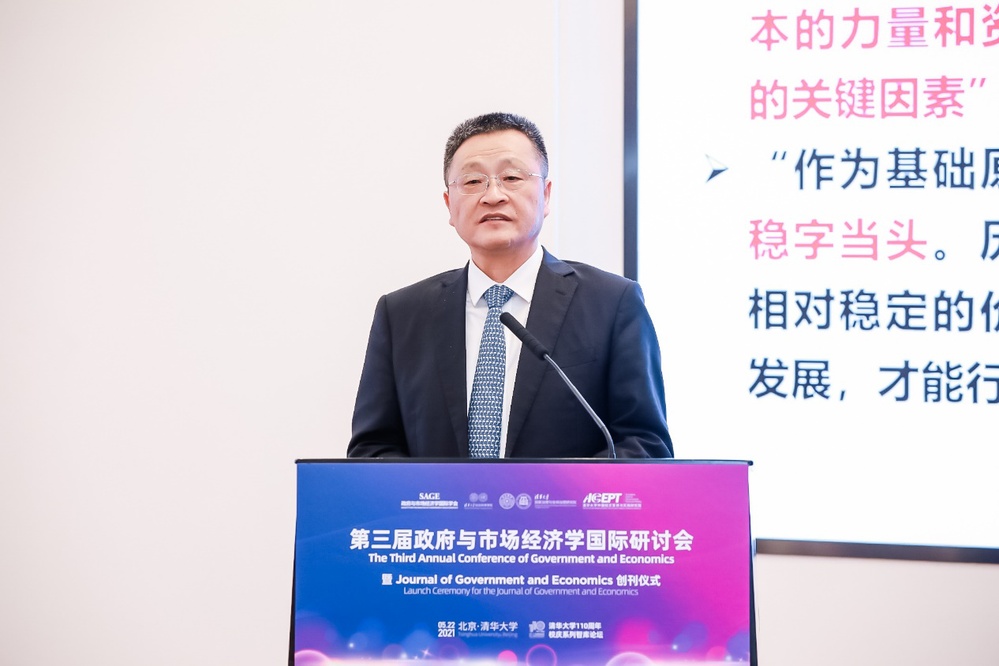
Ge Honglin pointed out that the government should effectively serve as the economy’s patron saint, looking out for its healthy development. He said that a city's vitality is more important than its strength, and that the government must continuously inject new vitality through economic development, using quality of life as a measure of this vitality. Economic development is a systematic project, and creating a healthy ecosystem is a necessary condition for success. The current housing problem is primarily concentrated in cities rather than rural areas, and to solve this problem, we cannot rely on market behavior to allocate resources. Instead, Ge Honglin proposes that each city should determine the increase or decrease of its own resident population according to its future development prospects, formulating policies accordingly. At the same time, cities should fully revitalize their unused industrial land held by central and local state-owned enterprises. Ge Honglin believes that the real estate industry should no longer serve as a pillar industry, but the improvement of housing conditions can be used as a driving force to promote consumption, such as through updated household appliances.
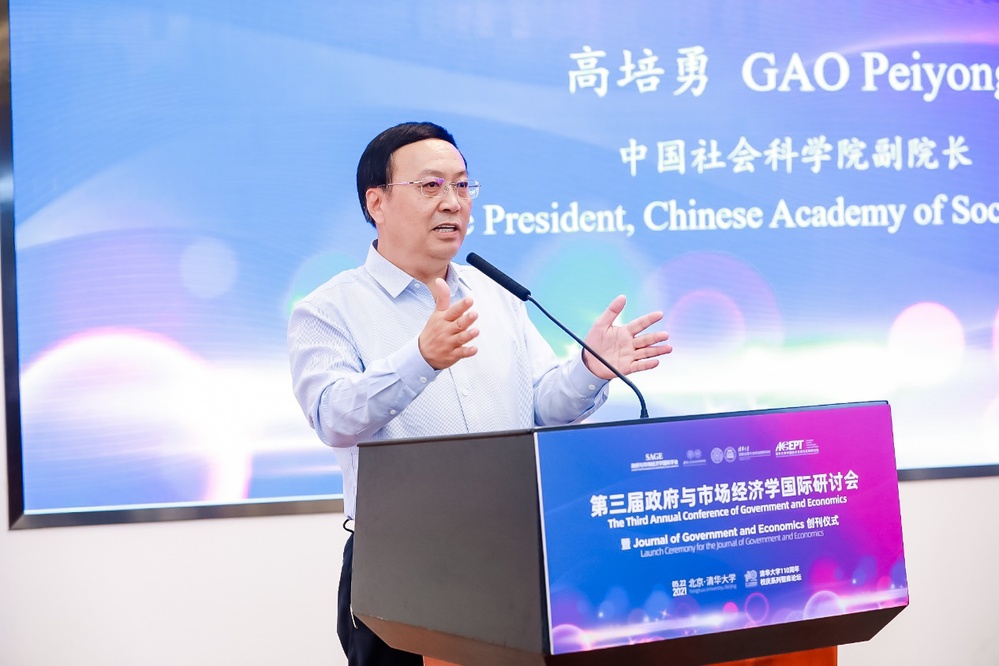
Gao Peiyong said that the pandemic has spurred significant changes in China’s government-market relationship, particularly from the perspective of macroeconomic policy configuration, which is increasingly centered on market players. He said that in 2020, China’s macroeconomic configuration was centered on the “six guarantees” and “six stabilities.” Among the six guarantees, the first three are the most important—namely, guaranteeing employment, the basic livelihood of the people, and market players. Furthermore, among these “top three guarantees,” guaranteeing market players is the most important. Only when the market is preserved can employment be preserved, and only when employment is preserved can people's livelihoods be preserved. Thus, only when the first three guarantees are achieved can the foundation of the Chinese economy be secured, and only then can industrial chains, supply chain security, food and energy security, etc. be guaranteed. The same is true of the six stabilities—only by protecting market players can we stabilize foreign trade, investment, finance, and expectations. Regarding the construction of the new development pattern, Gao Peiyong said that when the main strategic direction is to achieve a high level of self-reliance, success is dependent on innovation and reform, and the main subjects of this innovation and reform must be market players. Indeed, the vast majority of reform and innovation occurs in relation to market players, not only at the practical level, but also at the theoretical level, where the relationship between government and market players is becoming increasingly clear. On the topic of monetary policy, Gao Peiyong believes that it is now striving for flexibility, precision, reasonableness, and moderation, as well as maintaining a proper and sufficient level of liquidity and promoting financial support for the development of the real economy. The focus is also on the real economy and market players, which is different from expanding demand in general.
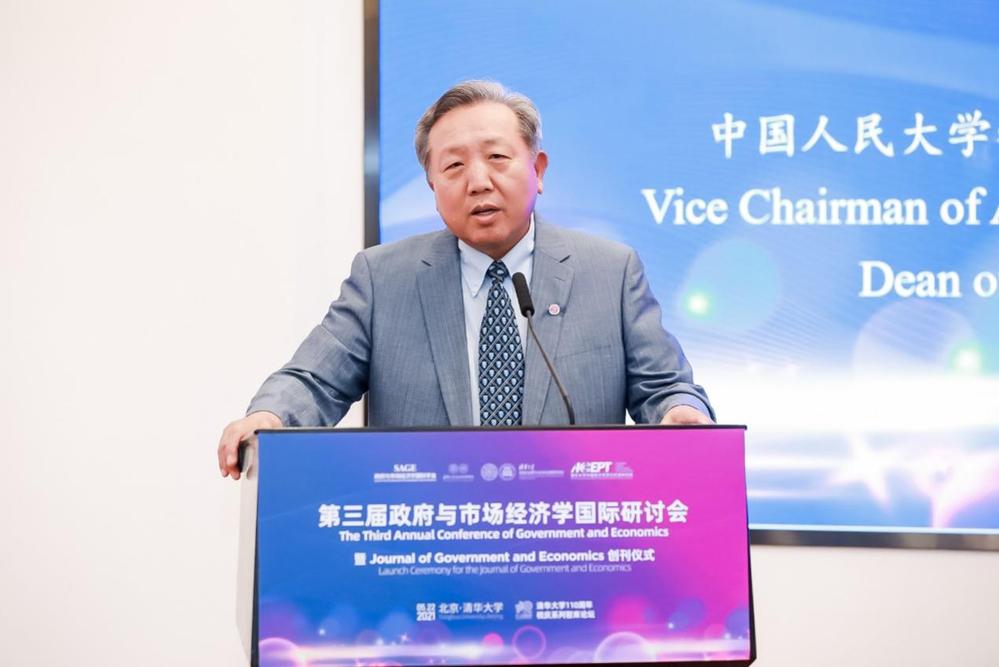
According to Wu Xiaoqiu, over the past 40 years, China has both abandoned the planned economy model of the former Soviet Union and decided not to follow the market economy model represented by the U.S. Instead, it has taken a third path—a path that first absorbed the rational, scientific, and civilized components of a market economy. Thus, China has a market economy, but not one that borders on fundamentalism. On this path, the boundary between government and market is continually optimized. Wu Xiaoqiu said, “The model of a planned economy is that the government covers almost everything, while the market has almost no boundary—there is almost no market. In the economic activities of Western countries, it cannot be said that the borders of government are absent, but they are very small—the market covers almost everything. In China, we are concretely optimizing this border space.” Regarding the role of the government in China, he also gave several examples. First, China's five-year plans, especially after reform and opening up, have been guiding, not mandatory, with unique priorities for each period. Second, the coordination of fiscal and monetary policies has prevented major inflation over the past forty years, even as China’s M2 has grown at twice the rate of GDP. Third, major infrastructure construction and its benefits, such as the contribution of China's high-speed rail to the country’s modernization, could not have been realistically achieved through private companies or foreign enterprises—their success is thanks to government design. Fourth, local governments do much more than perform simple service functions—they bear the weight of economic functions, and the core of investment attraction also depends on the relationship between the government and the market. Wu Xiaoqiu pointed out that the practice of China's reform and opening up over the past 40 years is enriching social and economic theory for all of mankind, which may be more applicable to countries with similar national conditions to China.
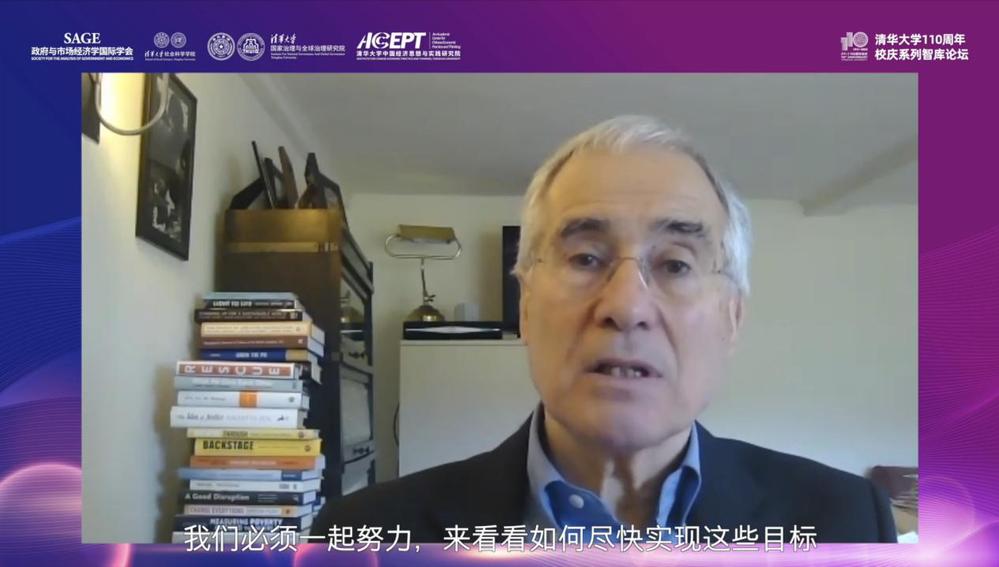
On the current hot topic of carbon neutrality, Nicholas Stern pointed out four major challenges. First, the combination of physical capital, human capital, natural capital, and social capital has changed people's understanding of the traditional growth model. Second, the world is pressed for time to achieve net-zero emissions in the next 30 to 40 years. Third, in the face of new technologies that keep emerging and developing, it is difficult to give accurate predictions and judgments regarding carbon targets. Fourth, the new development model will bring about a mismatch between production and consumption, and the process of achieving net-zero emissions will be hindered if the related benefits cannot be guaranteed. Although the role of the market is enormous, Stern argued that to achieve carbon neutrality goals, it is not feasible to rely solely on the market. Beyond recognizing the market forces at play, economists must understand the flaws of the market. Indeed, in a state of dysfunction and deficiency, even a market in a fully competitive state cannot guarantee its efficiency. Government effectiveness largely determines the protection of innovative R&D, the risk of capital markets, the implementation of public policies, and the functioning of cities, land, energy, transportation, and networks. Expanding on this point, Professor Stern listed six main ways in which government should support the market. First, by clarifying market expectations at the macro level to allow for more targeted investment and innovation. Second, by working with the private sector to channel more resources into technological innovation. Third, by reducing, managing, and assuming risks in infrastructure projects and financial capital markets. Fourth, by providing incentive measures in areas such as complete power grids, broadband, transportation, and the circular economy. Fifth, by providing consumers with more information on relevant products and technologies. Sixth, by strengthening pollution-related regulation and pricing to address market failures. He said that all government departments share the responsibility of achieving carbon neutrality, and it is worrisome to leave the fight against climate change to a single agency. Thus, mechanisms should be established to achieve comprehensive coordination within the government.
In the afternoon sessions, scholars from Tsinghua University, Duke Kunshan University, Beihang University, Stanford University, Arizona State University, Peking University, Hunan University, Birkbeck College of the University of London, Tel Aviv University, the Central University of Finance and Economics, Nankai University, Shanghai Normal University, and Renmin University of China discussed their research in government and economics.




